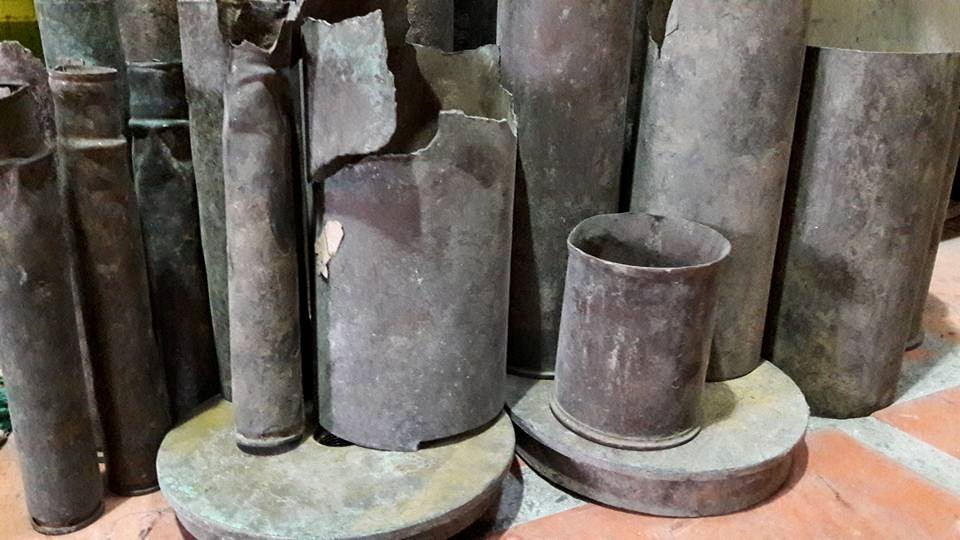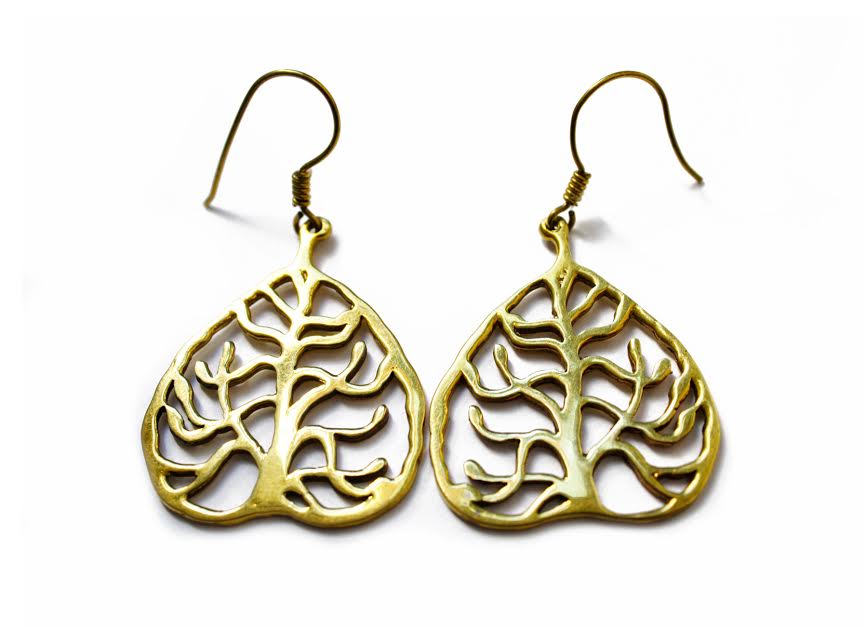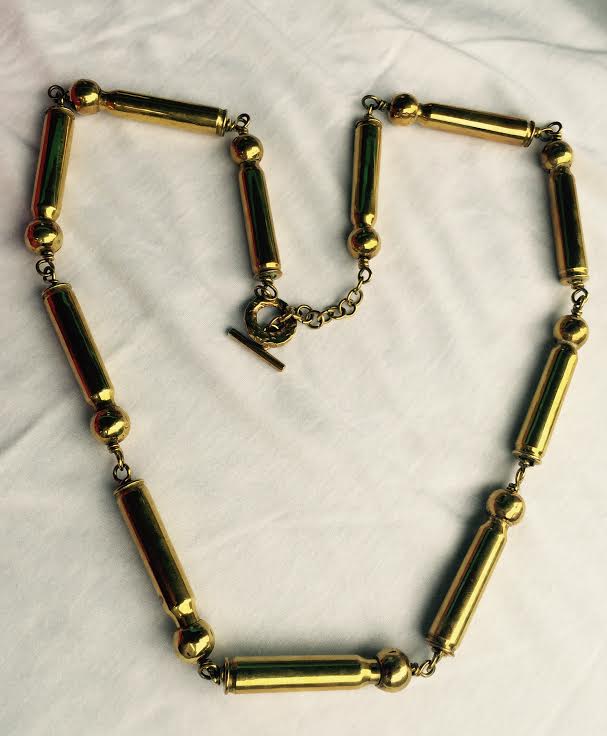Brass jewelry hand made from bombshells that helps transform
the scars of war into the beauty of peace. After two decades of war, one in every 250 Cambodians is disabled and the proportion of amputees - one in every 384 people - is the highest in the world.
The Cambodian countryside is littered with bomb casings. Crafts
men and women use the brass bombshells to create fashionable jewelry, statements for peace. This symbolic jewelry takes the scars of a country's horrific history and turns them into something beautiful while at the same time offering a more positive future for the artisans, as well as the direct victims of landmines. The jewelry shows a creative reaction to violent conflict, a way of reminding us of the impressive strength that lies within so many.
MILLIONS of LANDMINES
An estimated 2.7 million tons of landmines or UX OS were found in Cambodia after the notorious Khmer Rouge regime.
UNCLEAR LANDS
13% of dangerous land in Kingdom of Cambodia has been cleared of war remnants, which means 87% or 648km squares left to clear.
Background on Cambodia
Cambodia has a rich history marked by soaring achievements in art, religion and architecture and prolonged periods of entrenched war and grueling repression. Today, Cambodia is a nation at peace, ruled by a multiparty democracy under a constitutional monarchy. But while its economy is growing steadily and the country has increasingly become a popular tourist destination, millions of Cambodians still live in poverty.
Timeline of Major Events
1863
Cambodia becomes a protectorate of France.
1953
Cambodia wins independence from France.
1965
Cambodia breaks diplomatic relations with the United States and allows North Vietnamese guerillas to establish bases within the country.
1970
The Khmer Republic is established in a coup and the army is sent to fight the North Vietnamese in Cambodia.
1975
The Khmer Rouge led by Pol Pot occupies Phnom Penh and takes control of Cambodia.
All urban dwellers are forcibly evacuated to the countryside to become agricultural workers. Money becomes worthless, basic freedoms are curtailed and religion is banned. Over the next three years, nearly 2 million "enemies of the state" are executed in 'killing fields'.
1977
Fighting breaks out with Vietnam.
1979
A successful Vietnamese invasion causes Pol Pot and Khmer Rouge forces to flee.
1981
The pro-Vietnamese Kampuchean People's Revolutionary Party wins the elections to the National Assembly. The international community continues to recognize the exiled Khmer Rouge as the official Cambodian government.
1985
Cambodia is plagued by guerilla warfare. Hundreds of thousands of people flee Cambodia and become refugees.
1989
Vietnamese troops withdraw.
1991
A peace agreement is signed in Paris ending fighting among various factions in Cambodia.
1993
In general elections, the royalist Funcinpec party wins the most seats in parliament, the monarchy is resorted and the exiled Khmer Rouge loses its seat at the UN.
2007
The most senior surviving member of Khmer Rouge, Nuon Chea, is arrested and charged with crimes against humanity.
2008
The Cambodian People's Party (CPP) claims victory in national elections, which EU monitors claim fell short of international standards.
2011
Armed combat erupts in the disputed border region between Thai and Cambodian forces. Both countries eventually agree to withdraw troops from the region.
2012 July - Cambodia and Thailand withdraw their troops from a disputed border area near the Preah Vihear temple in line with a ruling by the International Court of Justice which aims to halt outbreaks of armed conflict in recent years.
2013 June - Parliament passes a bill making it illegal to deny that atrocities were committed by the Khmer Rouge in the 1970s.
2014 July - More than 150,000 Cambodian workers return home from neighbouring Thailand after rumours circulate that the new military junta there will crack down on illegal migrants.
2015 March - A UN-backed tribunal in Cambodia indicts two more former commanders of the Khmer Rouge, Im Cheam and Meas Muth, with crimes against humanity.
2016 July - Kem Ley, a political commentator and prominent critic of Prime Minister Hun Sen is shot dead in the capital Phnom Penh.
2017 September - Opposition leader Kem Sokha is charged with treason. November - Supreme Court dissolves the Cambodia National Rescue Party, the country's only significant opposition party.
2018 February - Cambodia introduces lese-majeste law, which makes it a criminal offence to defame or insult the king.
the scars of war into the beauty of peace. After two decades of war, one in every 250 Cambodians is disabled and the proportion of amputees - one in every 384 people - is the highest in the world.
The Cambodian countryside is littered with bomb casings. Crafts
men and women use the brass bombshells to create fashionable jewelry, statements for peace. This symbolic jewelry takes the scars of a country's horrific history and turns them into something beautiful while at the same time offering a more positive future for the artisans, as well as the direct victims of landmines. The jewelry shows a creative reaction to violent conflict, a way of reminding us of the impressive strength that lies within so many.
MILLIONS of LANDMINES
An estimated 2.7 million tons of landmines or UX OS were found in Cambodia after the notorious Khmer Rouge regime.
UNCLEAR LANDS
13% of dangerous land in Kingdom of Cambodia has been cleared of war remnants, which means 87% or 648km squares left to clear.
Background on Cambodia
Cambodia has a rich history marked by soaring achievements in art, religion and architecture and prolonged periods of entrenched war and grueling repression. Today, Cambodia is a nation at peace, ruled by a multiparty democracy under a constitutional monarchy. But while its economy is growing steadily and the country has increasingly become a popular tourist destination, millions of Cambodians still live in poverty.
Timeline of Major Events
1863
Cambodia becomes a protectorate of France.
1953
Cambodia wins independence from France.
1965
Cambodia breaks diplomatic relations with the United States and allows North Vietnamese guerillas to establish bases within the country.
1970
The Khmer Republic is established in a coup and the army is sent to fight the North Vietnamese in Cambodia.
1975
The Khmer Rouge led by Pol Pot occupies Phnom Penh and takes control of Cambodia.
All urban dwellers are forcibly evacuated to the countryside to become agricultural workers. Money becomes worthless, basic freedoms are curtailed and religion is banned. Over the next three years, nearly 2 million "enemies of the state" are executed in 'killing fields'.
1977
Fighting breaks out with Vietnam.
1979
A successful Vietnamese invasion causes Pol Pot and Khmer Rouge forces to flee.
1981
The pro-Vietnamese Kampuchean People's Revolutionary Party wins the elections to the National Assembly. The international community continues to recognize the exiled Khmer Rouge as the official Cambodian government.
1985
Cambodia is plagued by guerilla warfare. Hundreds of thousands of people flee Cambodia and become refugees.
1989
Vietnamese troops withdraw.
1991
A peace agreement is signed in Paris ending fighting among various factions in Cambodia.
1993
In general elections, the royalist Funcinpec party wins the most seats in parliament, the monarchy is resorted and the exiled Khmer Rouge loses its seat at the UN.
2007
The most senior surviving member of Khmer Rouge, Nuon Chea, is arrested and charged with crimes against humanity.
2008
The Cambodian People's Party (CPP) claims victory in national elections, which EU monitors claim fell short of international standards.
2011
Armed combat erupts in the disputed border region between Thai and Cambodian forces. Both countries eventually agree to withdraw troops from the region.
2012 July - Cambodia and Thailand withdraw their troops from a disputed border area near the Preah Vihear temple in line with a ruling by the International Court of Justice which aims to halt outbreaks of armed conflict in recent years.
2013 June - Parliament passes a bill making it illegal to deny that atrocities were committed by the Khmer Rouge in the 1970s.
2014 July - More than 150,000 Cambodian workers return home from neighbouring Thailand after rumours circulate that the new military junta there will crack down on illegal migrants.
2015 March - A UN-backed tribunal in Cambodia indicts two more former commanders of the Khmer Rouge, Im Cheam and Meas Muth, with crimes against humanity.
2016 July - Kem Ley, a political commentator and prominent critic of Prime Minister Hun Sen is shot dead in the capital Phnom Penh.
2017 September - Opposition leader Kem Sokha is charged with treason. November - Supreme Court dissolves the Cambodia National Rescue Party, the country's only significant opposition party.
2018 February - Cambodia introduces lese-majeste law, which makes it a criminal offence to defame or insult the king.














 RSS Feed
RSS Feed
